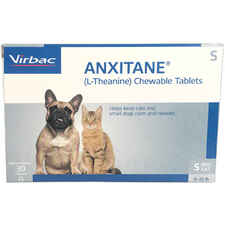Separation Anxiety in Dogs and Cats
Doctor of Veterinary Medicine

While efforts are made to answer all questions as quickly as possible, if an immediate answer is required or if your pet is in need of urgent or emergency care, contact your pet's veterinarian immediately.
Doctor of Veterinary Medicine

You will receive an answer from Dr. Lindsay and our vet/tech team as soon as possible, usually the same day.
All answers are provided for informational or educational purposes only, and are intended to be a supplement to, and not a substitute for, the expertise and professional judgment of your pet's veterinarian.
It may be necessary to consult your pet's veterinarian regarding the applicability of any opinions or recommendations with respect to your pet's symptoms or medical condition.
CloseDoctor of Veterinary Medicine

An error has occurred, please reload the page and try again.
CloseWhile efforts are made to answer all questions as quickly as possible, if an immediate answer is required or if your pet is in need of urgent or emergency care, contact your pet's veterinarian immediately.
There is no answer related to your question
What is separation anxiety?
When your dog or cat has separation anxiety, your pet becomes anxious because he or she is away from you. Pets exhibit separation anxiety with both physical and psychological problems. Many social animals—birds, horses, whales, monkeys—experience separation anxiety because they are genetically programmed to live within a social structure strengthened by emotional bonds, and this applies to dogs and cats as well.
Separation anxiety in dogs and cats causes undesirable behavior, and behavior problems are the #1 reason pets are euthanized. Dogs and cats with behavior problems frustrate their owners, and frustrated people often mistreat or relinquish their pets. Fortunately, you can prevent or cure your pet's separation anxiety.
Key facts about separation anxiety
- Separation anxiety gets worse, not better, unless treated.
- Having more than one pet doesn't mean your pet won't be anxious when you're away.
- Pets of all ages and breeds can have separation anxiety.
- Some pets develop separation anxiety gradually; others develop it after a precipitating event, such as boarding.
Separation anxiety: a serious problem for pets and their owners
Separation anxiety in dogs and cats is generally worse the first 15 minutes your pet is alone, but can persist during the entire time you're away. Common behavior problems that occur as a result of separation anxiety include destroying furniture, urinating or defecating inside the home, howling, barking, scratching, and barbering (in cats).
"Can't my pet just get over it?"
Unfortunately, no. Pets with separation anxiety generally get worse rather than better if they aren't helped—they don't just get over it. Anxiety eventually causes physical illness and your pet is miserable when he or she doesn't need to be.
Barbering (psychogenic grooming) in cats
Barbering is a compulsive, repetitive grooming by pets that pulls out (barbers) hair and creates bald patches. It is also called psychogenic grooming. The bald patches are never on the head or neck where your pet can't reach, but are on the flanks, belly, and hind limbs that are easily reached.
Barbering can be caused by many factors:
- Anxiety (separation from family)
- Allergies
- External and internal parasites (fleas, ticks, roundworms, tapeworms)
- Pinched nerves
- Autoimmune disease
- Endocrine disease (hyperthyroidism)
With some problems, especially fleas, your pet's skin itches. This itching stimulates cats to lick and groom until over-grooming becomes a habit. With other problems, cats have a psychological urge to lick, and the licking creates bacterial or yeast infections. These infections cause itching so the grooming behavior never stops.
"Does having two dogs or two cats make it less likely they will have separation anxiety?"
No. Pets from multi-pet households are as likely to have separation anxiety as pets from single-pet households. The company of other dogs or other cats doesn't prevent separation anxiety because it is the relationship your pet has with humans who they are separated from that causes anxiety.
Pets from multi-pet households can also develop anxiety if their pet companions are absent. Although you would think your pet would leap with joy when a pet companion returns, this doesn't always happen. Separated pets can physically harass each other when reunited, even after short separations. Harassment is more likely if your returning pet smells differently, such as after spending the day at the veterinary clinic. Slowly reintroducing cats avoids violence. Provide a Sentry Calming Collar for Cats, which contains a pheromone that makes cats feel peaceful when reintroducing pets. Provide herbal calming for cats that become hysterical and aggressive. For dogs, use Adaptil Collar for Dogs, which contains a calming pheromone for dogs.
Pets most at risk for separation anxiety
All breeds and all ages of cats and dogs may exhibit separation anxiety when their owners leave them home alone.
Try using the Thundershirt, a drug-free product, to help calm your pet as an alternative to giving medication.
























